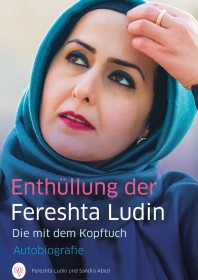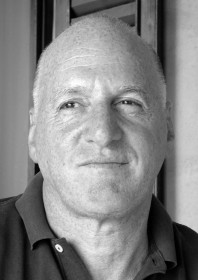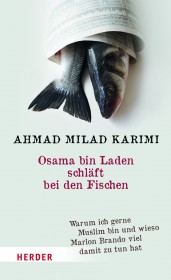A Conversation with Fereshta Ludin about the Headscarf Debate, Discrimination, and Her Hopes for the Future.
To win the right to work as a teacher in the classroom while wearing her headscarf, Fereshta Ludin had to go all the way to the German Supreme Court (see below). On 17 September 2015, she will join us as part of the series “New German Stories” to introduce her book Enthüllung der Fereshta Ludin. Die mit dem Kopftuch (“The Unveiling of Fereshta Ludin: The One with the Headscarf”). Rafiqa Younes and Julia Jürgens spoke with her in the lead-up to the event.

Book cover © Deutscher Levante Verlag
Ms. Ludin, did you ever guess that the first lawsuit you filed against your employers, in 1998 when you were 25 years old, would set off a nationwide debate about the headscarf ban?
You can’t really imagine something like that. I was still very young and idealistic. I wanted to work as a teacher and had no intention of provoking the public or any politicians.
From your perspective, was it worth it to go all that way through courts, becoming, as you did, a public figure – “the one with the headscarf” as the title of your book ironically references?
I don’t regret a single step along the way. I would have regretted much more, to have had to endure the injustice. I took an active stand against discrimination by going through the courts. Many other women were also affected. It was never my aim to become a public person. → continue reading

The author © David Ranan
For his book, “The shadows of the past are still long: Young Jews on their lives in Germany,” culture researcher, David Ranan, conducted interviews with Jews between 20-40 whose grandparents survived the Holocaust and then settled in Germany after the war. The London-based author will present his book at the Academy of the Jewish Museum Berlin on 7 July 2015, as part of the “New German Stories” series. In advance, we asked him three questions.
Julia Jürgens: Mr. Ranan, one question you asked your interviewees deals with the “packed luggage” the first and second generation seem to have at the ready, an expression of their inner conflict between being able to safely stay or having to again flee. Is there still this conflict within the third generation or how else would you describe its sense of belonging to Germany? → continue reading
“New German Stories,” an event series launched in January 2014 as part of the Academy program, continues this evening, 10 March 2015, when Ahmad Milad Karimi, Professor of Islamic Philosophy and Mysticism at the University of Münster, presents his new book Osama bin Laden is sleeping with fishes (Osama bin Laden schläft bei den Fischen) at the Academy of the Jewish Museum Berlin. We put three questions to our guest, prior to the event.

Ahmad Milad Karimi: Osama bin Laden is sleeping with fishes (Bookcover) © Herder Publishers
Julia Jürgens: Dear Mr. Karimi, in your autobiography you bring together Western popular culture and the history of Islamic intellectualism, the translation of the Koran and your PhD thesis on Hegel, Persian mysticism and a penchant for mafia films. If I may make a question of your book’s subtitle: What does Marlon Brando have to do with the pleasure you take in being Muslim?
Ahmad Milad Karimi: That is a secret of the book, a secret concealed first and foremost by the fact that there is always more to people than the pigeonhole we like to keep them in.
Six years ago you published your new translation of the Koran. What motivated you to take up such a challenge and add a new translation to those already in existence?
The Koran is more than simply a book—it is → continue reading


